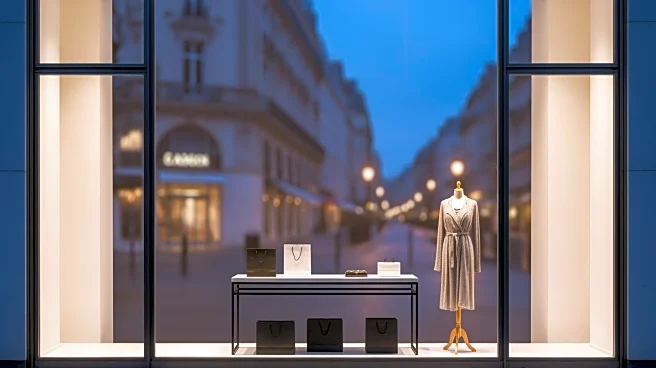What's Happening?
Shein, a Chinese budget retailer, has opened its first physical store in the BHV department store in Paris, marking a significant shift from its online-only model. This move has sparked controversy among
lawmakers and other retailers, who argue that Shein's low-cost business model is detrimental to traditional shopping streets. The opening aims to attract younger shoppers who favor online platforms for fashion and cosmetics. The partnership with Shein is seen as an innovative strategy by Société des Grands Magasins, which owns BHV, to boost foot traffic and sales. On the day of Shein's launch, BHV reported a 50% increase in store traffic, with a quarter of Shein's customers making additional purchases at BHV.
Why It's Important?
The opening of Shein's physical store highlights the growing influence of ultra-fast fashion on traditional retail models. Department stores, already struggling with reduced foot traffic due to the pandemic, face increased competition from online retailers like Shein. This development underscores the need for department stores to innovate and adapt to changing consumer preferences. In the U.S., similar challenges are evident as Macy's closes stores and Saks Global explores divestitures to manage debt. The partnership with Shein could serve as a model for other department stores seeking to revitalize their business by attracting a younger demographic.
What's Next?
Société des Grands Magasins plans to open additional Shein stores across France, although these plans have been delayed to refine marketing strategies. The Paris city hall has prohibited BHV from hosting outdoor Christmas events due to the controversial nature of Shein's presence. Additionally, the backlash against Shein has influenced European discussions on customs duties for low-value parcels, which could impact Chinese retailers like Shein and Temu by 2026. This mirrors similar changes in the U.S., where duty-free treatment for small parcels has been suspended.
Beyond the Headlines
The controversy surrounding Shein's store opening in Paris reflects broader tensions in the retail industry, particularly regarding the ethical implications of ultra-fast fashion. Critics argue that Shein's business model, which involves rapid production and low prices, undermines traditional retail and raises concerns about labor practices and environmental impact. The debate over customs duties for low-value parcels also highlights the challenges faced by international retailers in navigating regulatory environments. As department stores seek to adapt, they must balance innovation with ethical considerations and consumer expectations.










